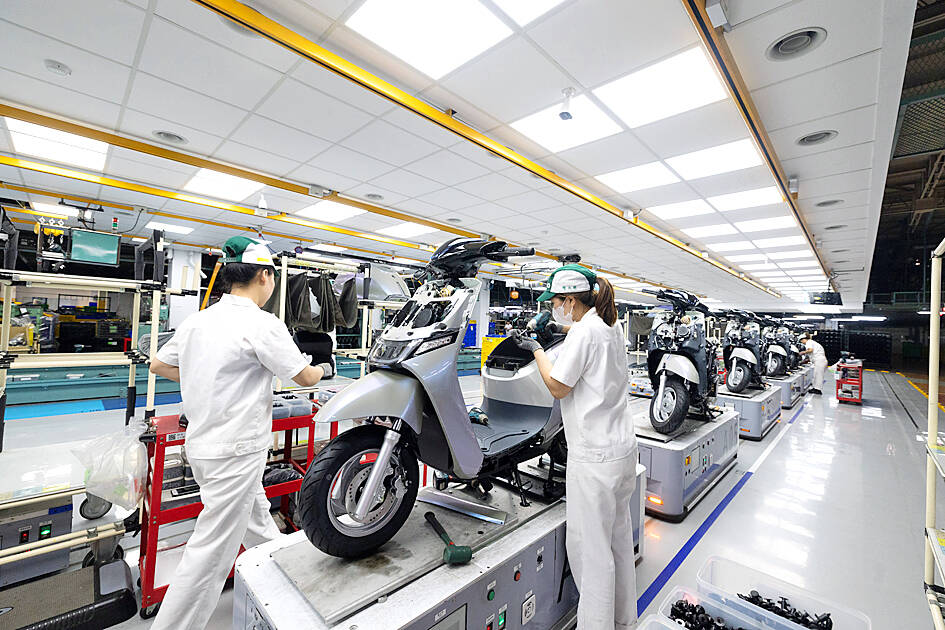Taiwan’s official manufacturing purchasing managers’ index (PMI) last month rose to 55.4, rebounding to expansion mode for the first time in 14 months, as firms rebuild inventory amid subdued uncertainty, the Chung-Hua Institution for Economic Research (CIER, 中華經濟研究院) said yesterday.
“The manufacturing industry reported business improvement in May, although uneven growth persisted,” CIER acting chairman Wang Jiann-chyuan (王健全) told a news conference in Taipei.
PMI data aim to gauge the health of the manufacturing industry, with values of 50 and higher suggesting expansion and scores lower than the neutral threshold suggesting a contraction.

Photo: CNA
It is the first expansion since May 2022 when Taiwanese manufacturers took a hit from a global slowdown induced by drastic inflation and monetary tightening.
The recovery came after the US and China put up decent economic showings with no new geopolitical tensions, Wang said.
That explained why the critical measures of new business orders and industrial output gained 13.7 and 10.9 points to 63.8 and 61 respectively, the monthly survey showed.
However, rush and short orders lingered, reflecting a conservative attitude among customers at home and abroad, Wang said.
Suppliers of electronics used in artificial intelligence products fared noticeably better than peers in other tech sectors, he said, adding that tech firms in general recover faster than non-tech companies, which remained weighed by weak demand and sharp competition.
The readings on inventory rose 2.1 points to 49.2, while customers’ inventory shed 1.8 points to 42.1, as they remained cautious, Wang said.
Sticky inflation in the US and the US Federal Reserve’s evasive stance on rate cuts lent support to that wariness, although firms grew more positive about their business prospects in the following months, the institute said.
The subindex on the six-month outlook rose 4.9 points to 60.1, its highest since April 2022, it said.
At the same time, the reading on raw material prices increased 2 points to 66.1, meaning that firms increasingly felt the pinch of price pressures.
The S&P Global Taiwan Manufacturing PMI, which was 50.9, arrived at a similar observation, finding that some manufacturers sought to protect their margin through a rise in output charges for the first time in five months.
The data on delivery time confirmed a recovery at 52.5, from 50.3 in April, as shipping container shortages and port congestions resurged due to conflict in the Red Sea, CIER said.
In related developments, nonmanufacturing companies also reported business improvements on the back of Mother’s Day celebrations, Wang said.
The nonmanufacturing index rose 0.1 points to 54.2, as service providers from almost all sectors registered positive cyclical movements, he said.
Nonmanufacturers reported positive views about their business, as evidenced by the six-month outlook, which rose 8.7 points to 63.6, the Taipei-based think tank said.
All sectors shared the optimism, thanks to the arrival of the high season for hospitality operators and TAIEX rallies that benefit financial service providers, it said.

In a small town in Paraguay, a showdown is brewing between traditional producers of yerba mate, a bitter herbal tea popular across South America, and miners of a shinier treasure: gold. A rush for the precious metal is pitting mate growers and indigenous groups against the expanding operations of small-scale miners who, until recently, were their neighbors, not nemeses. “They [the miners] have destroyed everything... The canals, springs, swamps,” said Vidal Britez, president of the Yerba Mate Producers’ Association of the town of Paso Yobai, about 210km east of capital Asuncion. “You can see the pollution from the dead fish.

SELL-OFF: Investors expect tariff-driven volatility as the local boarse reopens today, while analysts say government support and solid fundamentals would steady sentiment Local investors are bracing for a sharp market downturn today as the nation’s financial markets resume trading following a two-day closure for national holidays before the weekend, with sentiment rattled by US President Donald Trump’s sweeping tariff announcement. Trump’s unveiling of new “reciprocal tariffs” on Wednesday triggered a sell-off in global markets, with the FTSE Taiwan Index Futures — a benchmark for Taiwanese equities traded in Singapore — tumbling 9.2 percent over the past two sessions. Meanwhile, the American depositary receipts (ADRs) of Taiwan Semiconductor Manufacturing Co (TSMC, 台積電), the most heavily weighted stock on the TAIEX, plunged 13.8 percent in

A wave of stop-loss selling and panic selling hit Taiwan's stock market at its opening today, with the weighted index plunging 2,086 points — a drop of more than 9.7 percent — marking the largest intraday point and percentage loss on record. The index bottomed out at 19,212.02, while futures were locked limit-down, with more than 1,000 stocks hitting their daily drop limit. Three heavyweight stocks — Taiwan Semiconductor Manufacturing Co (TSMC, 台積電), Hon Hai Precision Industry Co (Foxconn, 鴻海精密) and MediaTek (聯發科) — hit their limit-down prices as soon as the market opened, falling to NT$848 (US$25.54), NT$138.5 and NT$1,295 respectively. TSMC's

MULTIFACETED: A task force has analyzed possible scenarios and created responses to assist domestic industries in dealing with US tariffs, the economics minister said The Executive Yuan is tomorrow to announce countermeasures to US President Donald Trump’s planned reciprocal tariffs, although the details of the plan would not be made public until Monday next week, Minister of Economic Affairs J.W. Kuo (郭智輝) said yesterday. The Cabinet established an economic and trade task force in November last year to deal with US trade and tariff related issues, Kuo told reporters outside the legislature in Taipei. The task force has been analyzing and evaluating all kinds of scenarios to identify suitable responses and determine how best to assist domestic industries in managing the effects of Trump’s tariffs, he